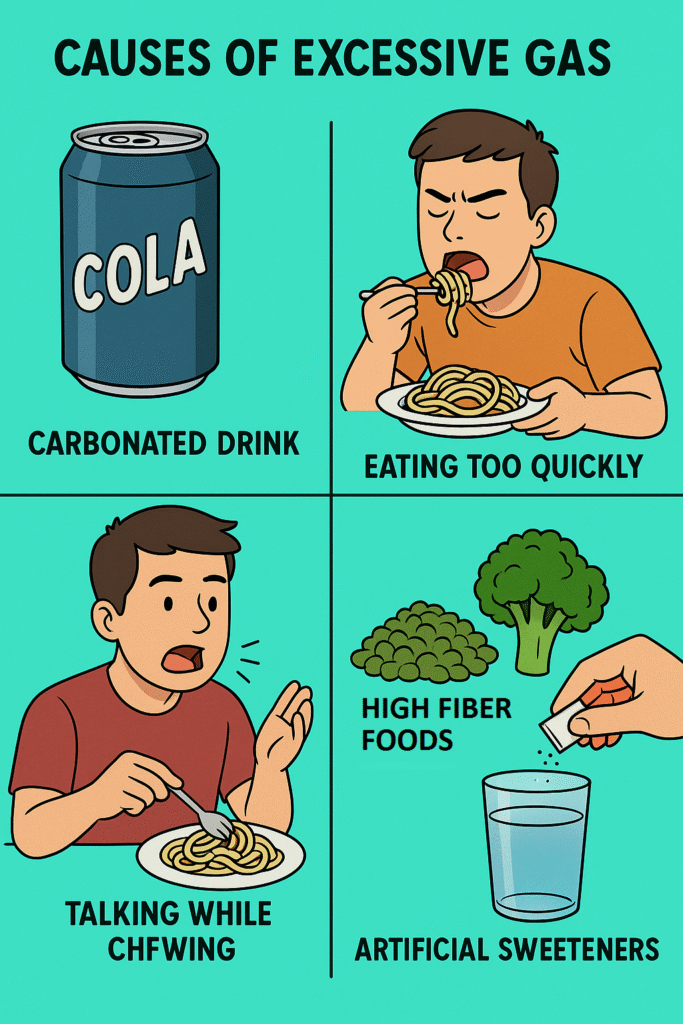We’ve all felt it—that uncomfortable, tight feeling in the belly that makes your jeans suddenly feel two sizes too small. Bloating. It’s one of the most common digestive complaints, affecting people of all ages. But what exactly causes a bloated stomach, and when should you be concerned?
In this article, we’ll break it down in plain language: what bloating is, why it happens, what causes it, who’s most at risk, and how to deal with it effectively.
What Is a Bloated Stomach?
A bloated stomach usually feels like fullness, tightness, or swelling in the abdomen. It can be mild or severe, occasional or persistent. Some people describe it as looking “pregnant” after a meal, even if they haven’t eaten much.
Bloating is extremely common. Studies estimate that about 16–30% of people experience it regularly, especially women and individuals with digestive disorders like IBS.
How Does Bloating Happen?
To understand bloating, think of your digestive system like a long, winding highway. Food, liquids, and gases move along this path in a smooth rhythm. But when that rhythm gets disrupted—due to extra gas, slow digestion, or inflammation—the system backs up. This causes pressure and distension in the gut, which we feel as bloating.
Here’s a simple analogy: imagine blowing up a balloon inside a tight box. That tension? That’s what your intestines feel like when gas or fluid gets trapped inside.
What Causes Bloating?
There’s no single cause, but several common culprits are known to puff up your belly. Let’s explore them.
1. Excess Gas (Most Common Cause)
Swallowed air or gas from food breakdown often gets trapped. This is the leading reason for bloating.
- Carbonated drinks like soda
- Eating too quickly
- Talking while chewing
- High-fibre foods (beans, lentils, broccoli)
- Artificial sweeteners (sorbitol, xylitol)

2. Constipation
When stool builds up in the intestines, it creates a blockage. The longer it sits, the more gas gets trapped behind it—causing bloating and discomfort.
3. Food Intolerances
Some people can’t digest certain sugars or proteins, leading to bloating.
- Lactose intolerance (milk and dairy)
- Fructose intolerance (found in fruits, sweeteners)
- Gluten sensitivity or celiac disease
4. Irritable Bowel Syndrome (IBS)
This chronic digestive condition often causes bloating, along with abdominal cramps, gas, and changes in bowel habits.
5. Hormonal Changes
Many women experience bloating before or during their period due to fluid retention and hormonal fluctuations.
6. Other Medical Causes (Less Common but Serious)
- Ascites – fluid buildup in the abdomen (seen in liver disease)
- Ovarian cancer – persistent bloating can be a red flag
- Bowel obstruction – severe and painful bloating with vomiting
Risk Factors
Anyone can feel bloated, but some are more prone than others. Here’s why:
- Women – Due to hormonal cycles and slower digestion
- People with IBS or digestive disorders
- High-stress individuals – Stress affects gut movement
- Poor dietary habits – Eating too fast or processed foods
- Ageing adults – Slower gut motility with age
Other Symptoms That May Come with Bloating
A bloated stomach often doesn’t come alone. You may also notice:
- Excessive gas or flatulence
- Burping
- Abdominal pain or cramps
- Feeling full quickly when eating
- Visible swelling of the abdomen
If the bloating becomes persistent, painful, or comes with weight loss, fever, or blood in the stool, it could signal something more serious.
How Is Bloating Diagnosed?
If your bloating is frequent, unexplained, or severe, your doctor might run tests to find the cause. These can include:
- Physical exam – feeling your abdomen for swelling or tenderness
- Blood tests – to check for inflammation or celiac disease
- Stool tests – to check for infection or fat malabsorption
- Breath test – for lactose or fructose intolerance
- Endoscopy or colonoscopy – if more serious issues are suspected
How to Treat a Bloated Stomach
Thankfully, bloating can often be managed at home. Here’s how:
✅ Mainstream Treatment: Diet and Lifestyle Changes
The gold standard treatment is usually identifying and avoiding triggers:
- Keep a food diary – note what you eat and how you feel afterward
- Try a low FODMAP diet – this eliminates certain hard-to-digest sugars (especially helpful in IBS)
- Avoid carbonated drinks
- Eat slowly and chew well
- Exercise regularly – even a short walk can help move gas through
✅ Medication Options
- Antacids – for bloating related to acid reflux
- Simethicone – breaks up gas bubbles
- Laxatives – for constipation-related bloating
- Probiotics – help balance gut bacteria
✅ Other Approaches
- Peppermint oil capsules – may reduce IBS-related bloating
- Cognitive-behavioural therapy (CBT) – helps if stress plays a role
- Avoid chewing gum and smoking – both increase swallowed air
When to Worry
Occasional bloating is normal. But you should see a doctor if you have:
- Bloating that doesn’t go away
- Severe abdominal pain
- Vomiting or nausea
- Blood in your stool
- Unexplained weight loss
These may point to more serious underlying conditions.
Final Thoughts
Bloating is uncomfortable—but in most cases, it’s harmless and manageable. Pay attention to what you eat, how you eat, and how your body responds. And remember, your gut talks to you. Sometimes, a puffy belly is just its way of saying, “Something’s not right here.”
References
- “Abdominal Bloating: Pathophysiology and Treatment” – Gastroenterology & Hepatology, April 2019. https://www.ncbi.nlm.nih.gov/pmc/articles/PMC6463041/
- “Bloating: An Overview” – Cleveland Clinic, 2022. https://my.clevelandclinic.org/health/symptoms/14581-bloating
- “Functional Bloating” – World Journal of Gastroenterology, 2014. https://www.ncbi.nlm.nih.gov/pmc/articles/PMC4089303/
